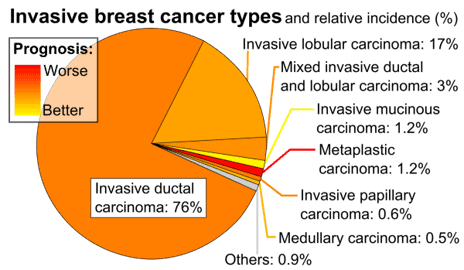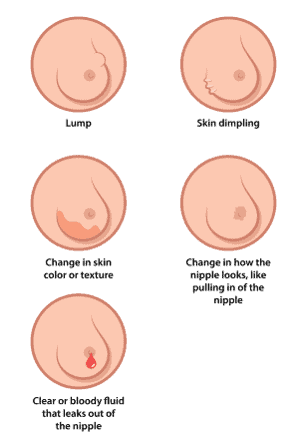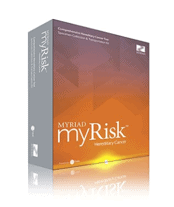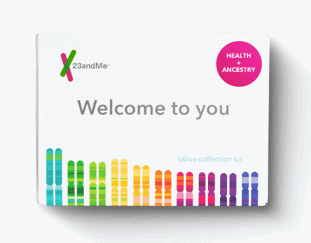Table of contents
What is Genetic Testing for Breast Cancer
Breast cancer is the most common type of cancer worldwide. About 1 in 8 U.S. women will develop it during their lifetime. By the end of 2021, there will be more than 3.8 million women in the U.S. with breast cancer. Genetic testing for breast cancer and counseling are viable options for those wanting to know if they have a higher risk.
Most direct-to-consumer tests search for BRCA1 and BRCA2 gene mutations, which are responsible for only seven percent of breast cancers. Moreover, the genetic test results are not always clear. A negative test result certainly provides relief but does not mean that risks are within the average of the rest of the population.
Breast cancer usually starts with a tumor that can be seen through an X-ray or as a lump. There are several types known. The most common ones include invasive lobular carcinoma and invasive ductal carcinoma. A less common type, angiosarcoma, accounts for only 1 to 2 percent of all sarcomas.

Symptoms vary, and some people do not have any signs or symptoms at all. Wide-spread campaigns promote self-examination in women for early detection. Some warning signs include:
- Lump in the breast or underarm
- Change in the size or shape of the breast
- Pain in the breast or nipple area
- Swelling or thickening of part of the breast

When a patient is diagnosed with breast cancer, they often get more than one kind of treatment. Usually, the first line of defense against spread is surgery, where the doctor removes the affected tissue. Other types of treatment include chemotherapy, radiation therapy, hormonal therapy, and biological therapy.
People who carry a mutation in BRCA1 or BRCA2 have an 87% chance of developing breast cancer by age 70. So getting tested for these genes is a good start to using information for your benefit and taking action in case of a positive test result.
Genetic testing is not perfect, and results may have different interpretations. A positive result only indicates a mutation in the gene tested for. This is not a 100% confirmation that you will not get breast cancer. Likewise, a negative result is not an indication that you will not get it during your lifetime. You may also receive news of a variant of uncertain significance, which indicates the presence of a gene that looks different, but hasn’t been confirmed to contribute to increased cancer risk.
This is why it is important to get genetic counseling and testing for breast cancer with a professional.
Why Genetic Testing for Breast Cancer?
If your grandmother or your mother had breast cancer, you can’t help but wonder if you will develop it too. In an attempt to reduce their chances, some women take a step ahead and undergo preventive surgery. But do you need genetic testing to find out your risk of ever developing cancer?
We mentioned above that genetic counseling with an expert is necessary even before taking the test. The following are some other points that will help you decide if genetic testing is for you.
Know your family’s history of breast cancer
The first step to understanding if you are at risk is to map your own family’s cancer history. To figure out if you are at risk or not, you may want to consider the following factors:
- You have relatives diagnosed with breast, ovarian, prostate, or pancreatic cancer
- You had cancer before age 50
- Any men in your family were diagnosed with breast cancer
- You have Ashkenazi Jewish ancestry
- A personal history of high-grade ovarian and high grade serous ovarian cancer
- Any family member has been diagnosed with BRCA1 or BRCA2 mutation
Discuss your personal and family history of breast cancer with your doctor
If you discover any family point of interest, take that information to your doctor. Seek a counselor’s advice if you are concerned. This will help clarify any doubts you may have concerning your risks.
Your genetic counselor will look at your family’s history and perform a hereditary cancer risk assessment. Then, based on the results, they will recommend genetic testing, which typically requires only a simple blood draw. It may also be recommended for you to start regular cancer screening.
Understanding the genes linked to breast cancer
BRCA1 and BRCA2 are the two most well-known genes whose hereditary mutations increase the risk of developing breast cancer. However, you should know that most cancers are not passed from parent to child. But what if you take a genetic test and this one comes out positive? What does it mean?
When a woman is found with abnormalities in BRCA1 or BRCA2 genes, she is usually diagnosed with Hereditary Breast and Ovarian Cancer (HBOC) syndrome. This essentially means that she has an 87% chance of developing cancer.
Preventative measures are then put into place. These include an annual breast MRI for women aged 25 to 29 and alternating with yearly mammograms once they turn 30.
Removing breast tissue or prophylactic bilateral mastectomy is an option for breast cancer management. It reduces your chances of ever developing it by 95%.
Learn more about BRCA1 and BRCA2 in this article about genetic cancer testing.
Genetic risk factors for hereditary breast cancer
Inherited mutations are responsible for a small percentage of breast cancers. Only 5-10 percent of cases in the U.S. are linked to a gene mutation. Half of these cases are caused by mutations in BRCA1 or BRCA2. Knowing your family medical history can help you assess whether you are likely to carry one of these genes. These statistics include both female and male breast cancer.
Other genes whose mutations are involved in an increased risk of breast and other forms of cancer are:
- ATM
- BARD1
- BRIP1
- BRCA1
- BRCA2
- CDH1
- CHEK2
- NBN
- NF1
- PALB2
- PTEN
- RAD51C
- RAD51D
- STK11
- TP53
These genes are less common than BRCA1/2, and there’s still a lot to learn about them.
When is genetic testing not recommended?
Remember that only a small percentage of breast cancers are caused by an alteration in the BRCA1/2 genes. This means that there is a minimal chance of carrying the mutation if there is only one person in your family who has it.
The option for testing is always there, but it might not be necessary if there is a low chance of finding a mutation. You should talk to your genetic counselor or health care provider before investing in a diagnostic test.
Genetic Testing for Breast Cancer
Genetic testing for breast cancer can help reduce and even prevent the onset of the disease. However, direct-to-consumer genetic testing usually tests for several gene mutations, but many more mutations are associated with breast cancer (more than 1,000 variants in BRCA1 and BRCA2 have been identified). Hence, a negative test indicates the no presence of a mutation in the genes tested only.
Some companies that offer genetic testing to find such mutations include.:
Myriad Genetics

The molecular diagnostics company offers Myriad MyRisk Hereditary Cancer, a genetic test for breast cancer that identifies people who carry BRCA gene mutations. They have been in the market for over 30 years. After years of research, they have developed proprietary techniques to better understand the disease’s genetics, onset, symptoms, and treatment.
They offer a report consisting of a summary of the mutations identified and their significance. This report also contains information on all the genes analyzed during the test, including 11 breast cancer genes and other types such as ovarian, pancreatic, prostate, and colorectal. These diagnostic tests may be covered by health insurance.
Go to our review on Myriad Genetics if you want to know more about how this company provides genetic testing.
23andMe

Health+Ancestry Service customers of 23andMe have access to a genetic test that searches for three variants in the BRCA1 and BRCA2 genes. The test is especially useful for people of Ashkenazi Jewish descent since those variants are more common among them. They can also be found in people of other ethnicities, but it is rare.
The 23andMe report only includes information on these three variants (out of the thousand possible). For customers who opt for this test, the company provides information on reading and using the report. It is clear that the report is not a complete BRCA genetic test, and it should not be used for medical decisions. Insurance companies typically do not cover direct-to-consumer tests.
Visit our review on 23andMe to learn more about how the company provides genetic testing, costs, reports, and much more.
Nebula Genomics
Nebula Genomics offers the most comprehensive genetic testing thanks to our 30x Whole Genome Sequencing (WGS). This guarantees the decoding of 100% of your DNA, revealing all sorts of helpful information, including genes that may increase the risk for breast cancer.
Nebula Genomics aims to empower people by examining their entire genetic composition and help assess susceptibility to any particular condition. While most companies only decode 0.02% of your DNA, Nebula sequences the entirety of your DNA, revealing the state of common and uncommon genes.
A thorough study of your genes can help you identify gene mutations associated with breast cancer. Nebula Genomics is not a clinical diagnostic company, and the reports do not offer cancer diagnoses. However, the high-quality reports can be taken to a genetics counselor or physician for further analysis.
If you liked this article, you should check out the other posts in the Genetic Cancer Testing series and explore the Nebula Research Library to learn about hundreds of other conditions influenced by genetics, including many cancers.
Other cancers:
- Colon Cancer Genetic Testing
- Pancreatic Cancer Genetic Testing
- Genetic Testing For Prostate Cancer
- Ovarian Cancer Genetic Testing
- Lung Cancer Genetic Testing
- Genetic Testing for Thyroid Cancer
Get your genome sequenced to receive personalized reports on all these conditions today!
September 28, 2021
Edited by: Christina Swords, Ph.D.
